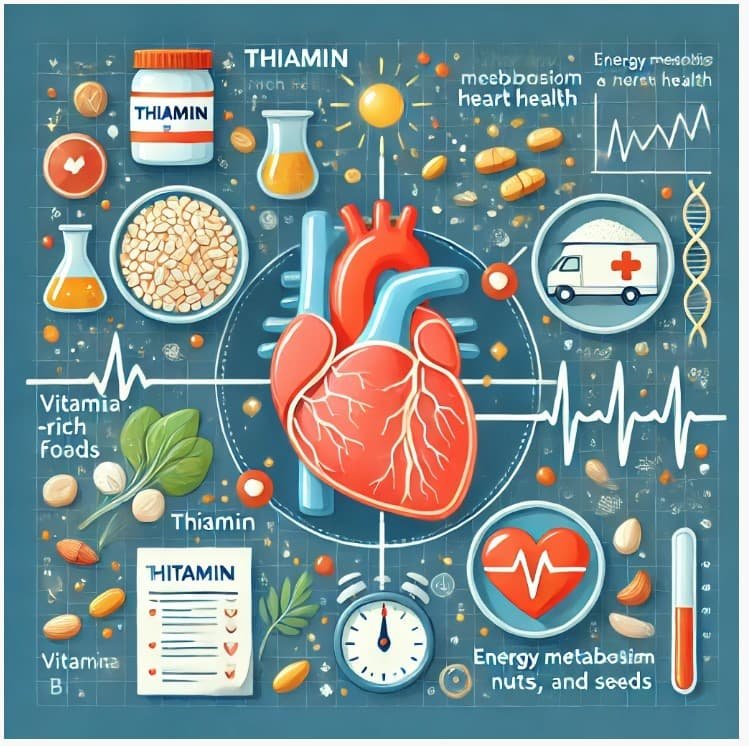Introduction to Thiamine and Heart Health
Thiamine, also known as vitamin B1, is a water-soluble vitamin that plays a crucial role in maintaining overall health, particularly heart health. It is vital for energy metabolism, nerve function, and the synthesis of DNA and RNA.
The importance of thiamine in cardiovascular health is gaining recognition, especially concerning heart failure and other cardiac conditions.
This article explores how thiamine impacts heart health, the consequences of its deficiency, and how supplementation can benefit those at risk.
The Role of Thiamine in Heart Health
- Energy Metabolism and Cardiac Function
Thiamine is essential for converting carbohydrates into energy, a process that is particularly critical in high-energy-demand organs like the heart.
The heart muscle requires a constant supply of power to function efficiently. Thiamine-dependent enzymes play a crucial role in the Krebs cycle, which is vital for producing ATP, the cell’s energy currency.
A thiamine deficiency can lead to inadequate energy production, weakening the heart’s ability to pump effectively.
- Prevention of Heart Failure
Studies have shown that thiamine deficiency is common in patients with heart failure, particularly those on long-term diuretic therapy. Diuretics, commonly prescribed to manage heart failure, can lead to the loss of thiamine through urine, exacerbating deficiency.
Research indicates that thiamine supplementation in these patients can improve heart function and symptoms, such as left ventricular ejection fraction, which measures the percentage of blood leaving the heart each time it contracts.
- Protection Against Oxidative Stress
Thiamine has antioxidant properties that help protect the heart from oxidative stress, which contributes to the development of cardiovascular diseases such as atherosclerosis and myocardial infarction.
By neutralizing free radicals, thiamine helps prevent the damage that can lead to these severe heart conditions.
Thiamine Deficiency and Heart Disease
Cardiac Beriberi and Heart Failure
Cardiac beriberi is a condition caused by severe thiamine deficiency, leading to heart failure. Although rare in developed countries, it is a critical condition in specific populations, such as chronic alcoholics, patients with malabsorption syndromes, and those with prolonged diuretic use.
Symptoms of cardiac beriberi include shortness of breath, rapid heart rate, and swelling of the lower extremities. If untreated, it can lead to heart failure and death (SpringerLink).
Impact on Congestive Heart Failure
Research has shown that patients with congestive heart failure (CHF) often have low levels of thiamine. This deficiency can worsen heart function, increasing fatigue, dyspnea, and fluid retention.
Supplementing with thiamine has been shown to improve heart function and reduce the severity of symptoms in CHF patients. In some studies, thiamine supplementation led to significant improvements in left ventricular ejection fraction, indicating better heart performance.
Thiamine Supplementation: Dosage and Benefits
Who Should Consider Thiamine Supplementation?
Thiamine supplementation is particularly beneficial for individuals at risk of deficiency, including those with heart failure, chronic alcoholism, diabetes, and malabsorption syndromes. The typical dosage ranges from 100 mg to 300 mg per day, depending on the severity of the deficiency. In acute cases, higher doses may be required under medical supervision.
Benefits of Supplementation
Thiamine supplementation can lead to several benefits for heart health, including improved cardiac function, reduced symptoms of heart failure, and better overall cardiovascular health. By restoring normal thiamine levels, supplementation helps ensure that the heart has sufficient energy to function optimally, reducing the risk of further complications (Buoy Health).
FAQs
Q1: Can thiamine deficiency lead to heart problems?
A1: Yes, thiamine deficiency can lead to severe heart conditions, including cardiac beriberi and heart failure. It is widespread in populations with chronic alcoholism, malabsorption issues, and those on long-term diuretic therapy.
Q2: How does thiamine benefit heart failure patients?
A2: Thiamine supplementation has been shown to improve heart function in heart failure patients by enhancing left ventricular ejection fraction and reducing symptoms like fatigue and fluid retention.
Q3: What are the recommended dosages for thiamine supplementation in heart health?
A3: The recommended dosage varies but typically ranges from 100 mg to 300 mg daily. In severe deficiency cases, higher doses may be administered under medical supervision.
Q4: Are there any side effects of taking thiamine supplements?
A4: Thiamine is generally safe, even in high doses, as it is water-soluble, and excess amounts are excreted in urine. However, some individuals may experience mild digestive discomfort.
Q5: What are the best dietary sources of thiamine?
A5: Good sources of thiamine include fortified cereals, pork, fish, beans, and nuts. These foods can help maintain adequate thiamine levels, supporting overall heart health (Health).
Conclusion
Thiamine is crucial in maintaining heart health, particularly for those at risk of deficiency due to medical conditions or dietary restrictions.
Supplementation can offer significant benefits, improving heart function and reducing symptoms in patients with heart failure.
Ensuring adequate thiamine intake through diet or supplements is essential for promoting long-term cardiovascular health.

